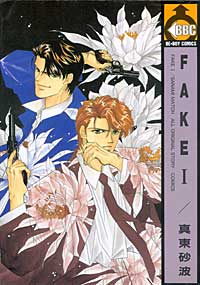
by Luis Reyes
|
Yaoi As Escapist Fiction - An avid reader of romance novels of the heterosexual variety, Edith opens up another facet of yaoi: Yaoi is about the strong connection that forms between two people on an emotional level, but that manifests itself on a very physical level. True love. It's titillating but not so much more than guy on girl stories that operate under the same premise. The development of the characters is paramount to the story. That's what matters.
Besides yaoi based on popular series, there are original titles that explore homosexual eroticism as well. "Fake" is an original manga that runs in BeBoy, a Japanese manga book published periodically. (Media Blasters releases the anime version here in the states but it isn't nearly as romantic as the manga.) "Fake" is the story of two New York cops - one is bi, one is gay - and is a mix of comedy and drama as they come to discover their feelings for each other. Both characters are iconic machismo cops who experience moments of vulnerability. Even though "Fake" doesn't acknowledge it, much yaoi makes an issue of homosexuality's social taboo, and this adds another level of tension to a story, the fact that the main characters are in love but have to keep it a secret or else suffer the wrath of their society. However, I believe that this is a relatively western conceit. Though Japan may have a reputation for sexual repression, the influx of western mores during the age of exploration may have contributed to this. Japan has a cultural history rich with sexuality in which men and women had several lovers and were open about sexual issues. Obviously, there were still restrictions, but they were not necessarily as puritan and intolerant as European values. Also, the concept of love isn't as unrealistically simplistic in Japan as it is in western countries (or isn't as unrealistically simple for women as it is for men). In addition to Yaoi, Japan has a twentieth century theater tradition called Takarazuka, an answer to Kabuki - restricted to men - in which all-female ensembles stage plays. It isn't uncommon for a female spectator to fall in love with a female actor playing a man. Love transcends gender. Love is love, like in romance novels. But there is an inherent eroticism that accompanies love ... like in romance novels. |

